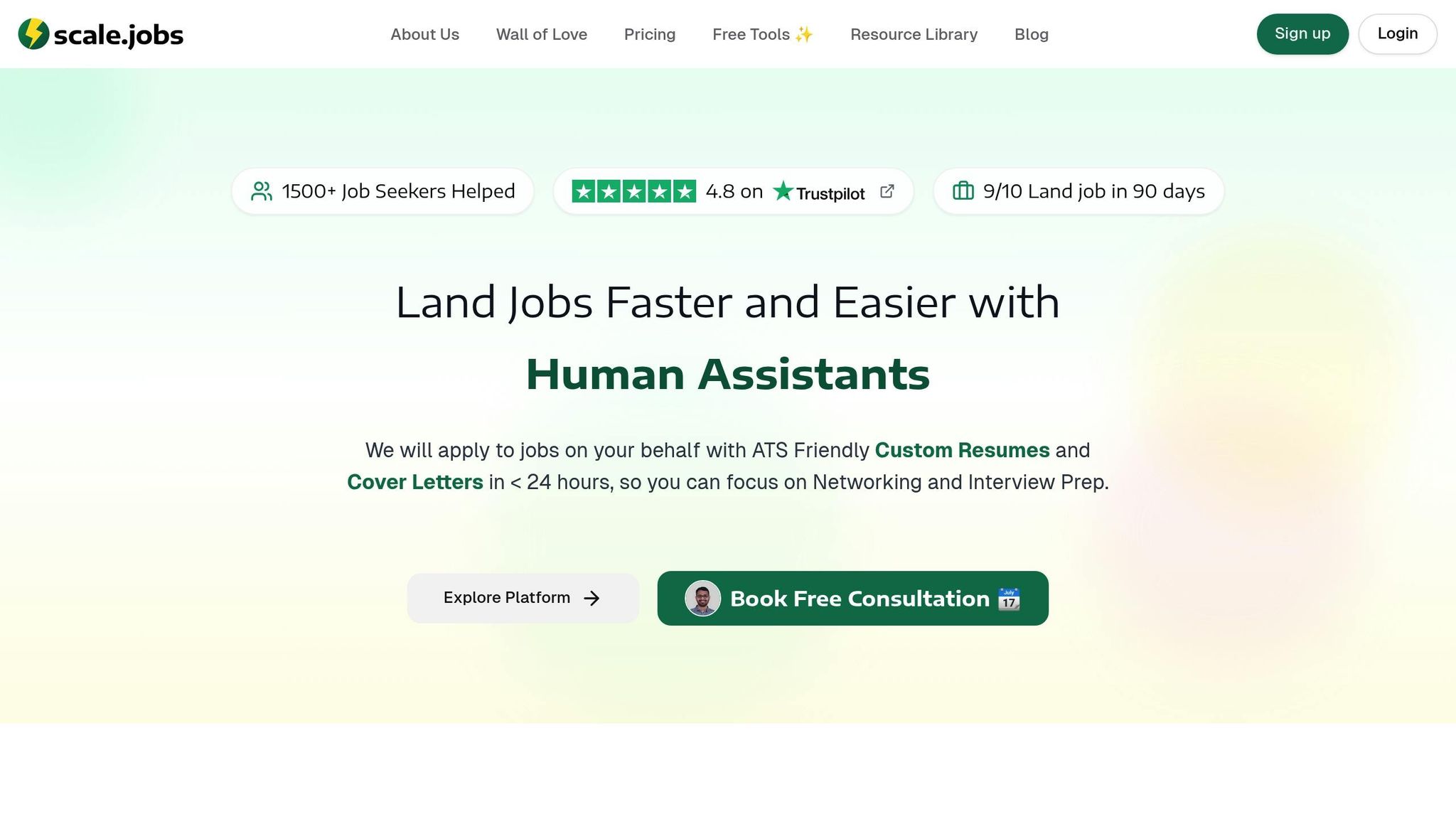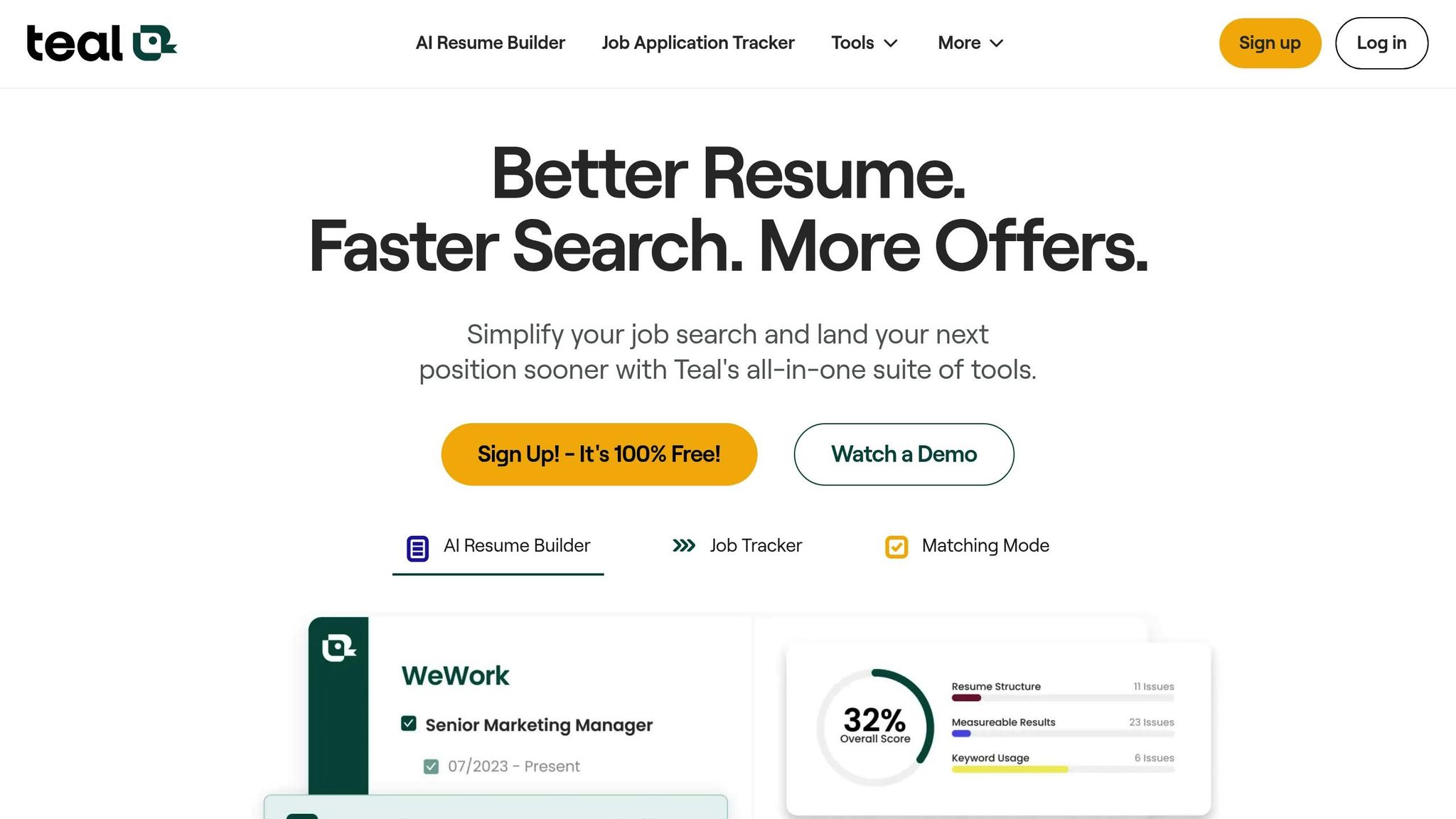Technical Skills for Hybrid Jobs: What to Learn
Learn essential technical skills for hybrid jobs in 2025, including cloud computing, data analysis, programming, and more to stay competitive.

Hybrid jobs are on the rise in 2025, blending technical skills with business expertise. These roles demand proficiency in tools and technologies that connect diverse teams and streamline workflows. If you’re looking to stay competitive in this evolving job market, here’s what you need to know:
- Cloud Computing: Master platforms like AWS, Azure, and Google Cloud for managing data, applications, and resources.
- Data Analysis: Learn tools like Tableau, Power BI, and SQL to turn raw data into actionable insights.
- Programming: Focus on Python, JavaScript, and SQL for automation and problem-solving.
- Cybersecurity: Understand basics like VPNs, encryption, and compliance frameworks to safeguard data.
- Project Management: Get comfortable with tools like Jira, Asana, and Trello, along with Agile and Scrum methodologies.
Hybrid roles also vary by field. For example:
- Engineering: Skills in DevOps, API integration, and system design are key.
- AI and Data Science: Expertise in machine learning frameworks, cloud AI platforms, and MLOps is crucial.
- Product Management and UX Design: Tools like Figma, Google Analytics, and A/B testing platforms are essential.
Staying updated is critical. Use platforms like Coursera, Pluralsight, and LinkedIn Learning for structured courses. Tools like Scale.jobs can also streamline your job search by identifying skill gaps, creating ATS-friendly resumes, and managing applications.
Hybrid jobs reward professionals who can combine technical expertise with business insight. By focusing on these skills and leveraging the right resources, you can thrive in today’s competitive job market.
Learn these 7 In-Demand Tech Skills for 2025 and Get Ahead!
Core Technical Skills for Hybrid Jobs
Hybrid professionals are expected to combine technical know-how with strategic thinking, creating a powerful blend of skills that drive success. As industries evolve, the demand for individuals who can bridge technical expertise with business strategy continues to grow. From healthcare to finance to retail, these core technical skills are becoming indispensable.
Cloud Computing Skills
Cloud platforms are the backbone of today’s business operations, making cloud expertise a must-have for hybrid professionals. Major players like Amazon Web Services (AWS), Microsoft Azure, and Google Cloud Platform dominate this space.
To navigate cloud computing effectively, professionals should understand how to manage data storage, deploy applications, and scale resources based on business needs. For instance, cloud storage and analytics tools can streamline campaign management or optimize HR systems.
Key areas to focus on include Infrastructure as a Service (IaaS), serverless computing basics, and cloud security. These skills not only help professionals collaborate with IT teams but also empower them to make smarter technology decisions.
Data Analysis and Visualization
As businesses store massive amounts of data in the cloud, the ability to analyze and visualize that data has become non-negotiable. Data literacy is no longer optional - it’s a core skill for hybrid roles. While Excel remains a staple, tools like Tableau and Microsoft Power BI are essential for deeper insights.
These tools allow professionals to transform raw data into actionable insights. Power BI integrates seamlessly with Microsoft Office 365, while Tableau excels in handling complex datasets and creating compelling visualizations. Whether it’s identifying sales trends or optimizing supply chains, the ability to connect data sources, build interactive dashboards, and present clear insights sets hybrid professionals apart.
Programming and Software Development
Programming skills in hybrid roles often focus on solving problems and automating tasks rather than building entire software systems. Python stands out for its flexibility, making it ideal for tasks like data manipulation, web scraping, and automating repetitive processes. SQL is another critical skill, used to query databases and extract meaningful insights.
JavaScript is increasingly valuable as more workplace tools become web-based. It enables professionals to customize dashboards, automate online tasks, and integrate different software platforms. By leveraging these programming languages, hybrid professionals can streamline workflows and align technical solutions with business goals.
Cybersecurity Basics
As remote work and digital transformation expand, cybersecurity has become a critical skill for hybrid professionals. Knowing how to implement multi-factor authentication, use VPNs, and understand data encryption is essential for safeguarding sensitive information.
Professionals also need to recognize phishing attempts and social engineering tactics, as these are common methods used in cyber attacks. A basic understanding of compliance frameworks like GDPR or HIPAA ensures proper handling of data, bridging security knowledge with everyday business operations.
Project Management Tools
Managing complex projects across teams and stakeholders is a common challenge in hybrid roles. Tools like Jira are widely used in tech environments for issue tracking and agile project management. Asana offers an intuitive way to coordinate cross-functional projects, while Trello’s visual kanban boards simplify task management.
For projects with strict deadlines, Microsoft Project remains a go-to choice, especially in industries like construction, manufacturing, and consulting. Monday.com is also gaining popularity for its customizable workflows and integration options. Mastering methodologies like Agile, Scrum, and Waterfall helps professionals efficiently manage projects, aligning technical project management with broader business strategies.
Technical Skills by Job Category
Here’s how key technical skills come into play across major hybrid job categories. Let’s dive into how these roles leverage specialized tools and knowledge.
Engineering and IT Hybrid Roles
Engineering hybrids are expected to bridge the gap between technical complexity and business needs. They must communicate intricate concepts to non-technical stakeholders while making critical decisions about system architecture. Building on foundational skills, these roles demand expertise in specific tools and frameworks.
- DevOps and Infrastructure: Proficiency in Docker is vital for containerization, while Kubernetes simplifies scaling and managing containerized applications. Tools like Terraform, which support Infrastructure as Code (IaC), allow engineers to programmatically manage cloud resources.
- System Design and Architecture: Advanced knowledge of distributed systems, load balancing, and database sharding is crucial for designing scalable, efficient solutions.
- API Development and Integration: Skills in RESTful API design, GraphQL, and microservices are essential for seamless system integration and webhook management.
- Monitoring and Observability: Tools like Datadog, New Relic, and Prometheus provide real-time insights into system performance, ensuring smooth operations.
On a parallel track, AI roles demand a mix of analytical expertise and deployment capabilities.
AI and Data Science Hybrid Roles
AI professionals play a critical role in converting complex algorithms into actionable insights for decision-makers. Their work requires a blend of technical fluency and strategic thinking.
- Machine Learning Frameworks: TensorFlow and PyTorch are go-to frameworks, with TensorFlow often used in production and PyTorch favored for research. Scikit-learn remains a staple for traditional machine learning tasks.
- Cloud-Based AI Platforms: Platforms like Amazon SageMaker, Google Cloud AI Platform, and Azure Machine Learning streamline the deployment of AI solutions, offering end-to-end workflows from data preparation to model deployment.
- Data Engineering Skills: Clean, structured data is the backbone of AI projects. Tools like Apache Spark for big data, Apache Kafka for real-time streaming, and Apache Airflow for workflow orchestration are essential. A solid understanding of ETL processes ensures data quality and readiness.
- MLOps and Model Management: Tools like MLflow, Kubeflow, and Weights & Biases help manage the lifecycle of machine learning models, from version control to deployment, making workflows smoother and more efficient.
- NLP and Computer Vision: Libraries like Hugging Face Transformers, OpenCV, and spaCy empower AI professionals to create advanced applications. Familiarity with pre-trained models and transfer learning accelerates development and deployment.
Meanwhile, product and UX roles focus on tools and methodologies that enhance user experience and product success.
Product Management and UX Design Hybrid Roles
These roles combine technical expertise with a deep understanding of user needs and constraints to create impactful digital products.
- Design and Prototyping Tools: Tools like Figma enable real-time collaboration, while Sketch and Adobe XD cater to specific workflows. Advanced prototyping tools like Framer and Principle help simulate complex interactions and animations.
- Product Analytics Platforms: Platforms like Google Analytics 4 and Mixpanel offer insights into user behavior, while Amplitude provides advanced cohort analysis for data-driven decisions.
- A/B Testing and Experimentation: Tools like Optimizely, VWO, and Google Optimize allow product teams to validate design decisions with real-world data, emphasizing the importance of statistical rigor.
- Customer Feedback and Research Tools: Platforms like Hotjar provide heatmaps and session recordings, while UserVoice and Productboard help gather and prioritize feature requests. UserTesting.com offers qualitative insights through user interviews and usability testing.
- Agile and Lean Methodologies: Familiarity with Scrum, sprint planning, and backlog management is essential. Tools like Miro and Mural support collaborative design sprints and workshops aimed at aligning teams around user needs.
- Basic Front-End Development: A working knowledge of HTML, CSS, and JavaScript helps product professionals communicate effectively with engineers. Familiarity with design systems like Material Design ensures consistency across digital products.
Each of these categories demonstrates how technical skills are tailored to meet the unique demands of hybrid roles, blending technical expertise with strategic and user-focused approaches.
How to Keep Learning Technical Skills
The tech world moves fast, and staying relevant means constantly upgrading your skills. To keep up, you’ll need a clear plan to identify gaps and tackle new trends head-on.
Assess Your Current Skills
Before diving into new courses or tutorials, take a moment to evaluate where you stand. Rate your skills from beginner to expert to pinpoint your strengths and areas for growth.
Job postings can be a goldmine for this. Look at the "required" versus "preferred" skills in listings for roles you're aiming for. Skills that show up repeatedly are often must-haves, while less common ones can help you stand out.
Industry reports like Stack Overflow's Developer Survey or GitHub's State of the Octoverse are also great resources. They reveal trends in programming languages, tools, and practices, helping you prioritize what to learn next.
Don’t stop there - ask for feedback. Chat with colleagues or mentors, especially those in roles you aspire to. Their insights can uncover skill gaps you might not have noticed.
This self-assessment will guide your learning and ensure you're focusing on what matters most.
Online Learning Platforms
The internet is packed with learning options, but it’s smart to stick with platforms that offer industry-relevant, up-to-date content.
- Coursera: Known for partnerships with top companies like Google, IBM, and Amazon, Coursera provides certificate programs designed for the workplace. For example, Google's Data Analytics Certificate includes hands-on projects with real datasets.
- Pluralsight: Perfect for tech professionals, Pluralsight offers tools to track your progress and identify knowledge gaps. Their expert-designed learning paths adapt to industry changes, keeping you current.
- LinkedIn Learning: Completing courses here adds credentials directly to your LinkedIn profile. The platform also recommends courses based on job market trends, making it easy to align your learning with demand.
- Udemy: Affordable and often on sale, Udemy offers courses led by industry professionals. Look for highly-rated courses to ensure quality.
For cloud skills, platforms like AWS, Microsoft Azure, and Google Cloud provide certification programs that evolve alongside their technologies, offering hands-on learning that’s always relevant.
Free resources like YouTube can also be helpful. Channels like Traversy Media (web development) or 3Blue1Brown (data science) are excellent for supplementing your studies, though they may lack the structure of formal courses.
Now, let’s look at how job search platforms can double as learning tools.
Job Search Platforms for Skill Development
Job search platforms today are more than just a place to find listings - they can also help you identify and close skill gaps. This is especially useful for hybrid roles that require a mix of technical and business expertise.
Take Scale.jobs, for example. When you upload your resume, their AI compares your skills to job postings and suggests areas for improvement. If you’re eyeing a data science role, it might highlight the need for tools like Apache Spark, giving you a clear direction for further training.
Scale.jobs also offers human assistant services to review your applications and pinpoint missing skills. Plus, its job application tracker lets you analyze which skills are getting the most traction with employers. This feedback loop can help you refine your learning strategy.
Their interview prep tools, like a question predictor, can also identify technical topics you need to study further. And if you’re building a portfolio, their website generator ensures your skills are showcased in a way that grabs employers' attention.
Scale.jobs vs Other Job Search Platforms

When it comes to job searching, picking the right platform can make a huge difference. For hybrid job seekers - those balancing technical know-how with the need for intuitive support - finding a platform that offers both advanced tools and personalized assistance is key. Scale.jobs stands out by combining software, AI-driven tools, and human expertise into one streamlined solution.
Why Scale.jobs Stands Out
What makes Scale.jobs different? It offers a three-tier support system that adapts to your needs. Start with free tools, then upgrade to AI assistance or full human support as your job search progresses.
One standout feature is its human assistant support, which sets it apart from competitors like TealHQ and Jobscan. Instead of relying solely on automation, Scale.jobs provides trained virtual assistants and reverse recruiters to handle the heavy lifting. From crafting ATS-friendly resumes to submitting applications on your behalf, these professionals save you over 20 hours a week - time you can use for networking or prepping for interviews.
Another highlight is its flat-fee pricing model, which eliminates the hassle of recurring subscriptions. With Scale.jobs, you pay once for a set number of applications. Didn't use all your credits? No problem - you’ll get a refund. This flexibility is something traditional subscription-based services don’t offer.
Transparency is also a major focus. Real-time updates via WhatsApp and time-stamped proof-of-work screenshots keep you informed every step of the way. Plus, all tools, from the free resume builder to human-assisted services, are optimized for ATS compatibility, ensuring your applications get noticed.
Platform Comparison: Scale.jobs vs TealHQ vs Jobscan

Here’s how Scale.jobs stacks up against some of its competitors:
| Platform | Free Tools | AI Features | Human Support | Pricing | Real-Time Updates |
|---|---|---|---|---|---|
| Scale.jobs | Resume builder, job tracker, networking tools | $9–$19/month for unlimited AI resumes/cover letters | Flat-fee human assistants starting at $199 | Free tools, flat-fee for human services | WhatsApp updates with proof screenshots |
| TealHQ | Basic job tracking, limited resume tools | $9/month for AI resume optimization | None | Monthly subscription required | Email notifications only |
| Jobscan | Limited free resume scans | $49.95/month for AI matching | None | Expensive monthly subscription | Basic email updates |
For example, while Jobscan charges $49.95 per month for its premium features, Scale.jobs offers unlimited AI assistance for only $19 per month, plus the option for one-time payments for human support. Similarly, competitors like LazyApply, which focuses solely on automated applications starting at $99, lack the personal touch and transparency that Scale.jobs provides. These comparisons make it clear how Scale.jobs’ comprehensive approach simplifies and enhances the job search process.
Scale.jobs Key Features
Let’s dive deeper into the features that make Scale.jobs a top choice for job seekers:
- WhatsApp Integration: Stay updated in real time with notifications about application submissions, scheduled interviews, or feedback.
- Proof-of-Work Screenshots: Track your job search progress with time-stamped images showing when and where your applications were submitted.
- Any-Portal Compatibility: Scale.jobs’ human assistants can apply through corporate ATS systems, niche job boards, or direct company websites, giving you broader reach.
- 24-Hour Turnaround and Refunds: Get custom documents within 24 hours, and enjoy refunds for unused credits - something many subscription-based platforms don’t offer.
For hybrid job seekers aiming to showcase both their technical abilities and their fit for a role, Scale.jobs offers the perfect blend of AI precision and human insight. Its all-in-one design means you won’t need to juggle multiple tools or subscriptions. Instead, you’ll have a smoother, more efficient job search experience that helps you stand out in a competitive market.
Conclusion: Getting Ready for Hybrid Careers
The job market has undergone a major transformation, with hybrid roles becoming the new norm. These positions require a blend of technical know-how and the ability to work across different functions. Building the right technical skills is essential to stay competitive in a world where departmental lines are increasingly blurred.
To thrive in a hybrid career, you'll need a mix of skills like cloud computing, data analysis, programming, and cybersecurity - tailored to your specific role. The secret to staying relevant? Commit to lifelong learning. Technology changes fast, and what’s innovative today might be outdated tomorrow. Regularly evaluate your skills, work on hands-on projects, and stay updated with industry trends. This approach not only sharpens your expertise but also helps you refine your job search strategy.
Speaking of job searches, having a solid plan can make all the difference. That’s where Scale.jobs comes in. They simplify the process by blending human insight with AI-driven precision. While you focus on honing your technical skills, their team takes care of the application process - creating ATS-friendly resumes, providing proof-of-work screenshots, and even sending updates via WhatsApp, all for a flat fee.
This service is especially helpful for recent grads, those navigating layoffs, or international job seekers. It allows you to channel your energy into developing your skills, while experienced professionals handle the complexities of job applications.
Hybrid roles reward those who can merge technical expertise with business acumen. By mastering these skills and using tools like Scale.jobs, you’ll be well-equipped to succeed in the evolving hybrid job market.
FAQs
What technical skills are most important for hybrid roles across industries?
In 2025, some of the most sought-after technical skills for hybrid roles will include cloud computing (think platforms like AWS and Azure), cybersecurity, data analysis tools and languages (such as Python, R, and Tableau), and a solid understanding of AI and machine learning fundamentals. For industries with a heavier tech focus, expertise in DevOps - including tools like Kubernetes and CI/CD pipelines - will be in high demand.
Different industries will also have unique technical priorities. For instance, healthcare places a high value on data visualization and statistical analysis, while fields like finance and marketing lean more toward skills in SQL, data governance, and advanced analytics tools. Ultimately, hybrid roles require a broad mix of technical knowledge, tailored to the specific needs of the sector, with particular emphasis on cloud technologies, cybersecurity, and AI-powered solutions.
What are the best ways to stay updated on technical skills for hybrid job roles?
To thrive in today's hybrid job markets, it's essential to sharpen technical skills that employers are actively seeking. Areas like cloud computing (think AWS, Azure, or Google Cloud), cybersecurity, and tools for remote collaboration are at the forefront. As more businesses embrace hybrid work models, these abilities have become increasingly important.
Make continuous learning a priority. Online courses, certifications, and workplace training programs offer flexible ways to expand your skill set. Many companies now embed learning opportunities directly into their workflows, allowing employees to upskill without stepping away from their roles. Staying on top of trends in remote work and keeping an eye on emerging technologies can also give you an edge, helping you adapt and stay relevant in your career.
For job seekers, platforms like scale.jobs can streamline the process. They provide resources like an ATS-friendly resume builder, a cover letter generator, and even human-assisted services to help you highlight your updated skills effectively.
How can job search platforms like Scale.jobs help identify skill gaps and improve job applications?
Job search platforms such as Scale.jobs can be a game-changer when it comes to identifying and addressing skill gaps. Using AI-driven analysis, the platform highlights both technical and soft skills you may need to strengthen. From there, it provides personalized recommendations to help you refine your qualifications and better match job requirements. This tailored approach can make your applications more impactful.
Beyond skill analysis, Scale.jobs equips users with tools like ATS-friendly resumes, custom cover letters, and even human-assisted services. These features ensure your applications are not only well-targeted but also stand out in a crowded job market. Unlike traditional platforms, which often lack real-time customization and transparency, Scale.jobs focuses on efficiency, helping you save time and prioritize landing interviews and job offers.




